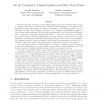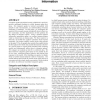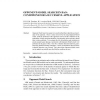82 search results - page 12 / 17 » Explicit Knowledge Programming for Computer Games |
165
click to vote
SIAMCOMP
2010
15 years 19 days ago
2010
We reexamine what it means to compute Nash equilibria and, more generally, what it means to compute a fixed point of a given Brouwer function, and we investigate the complexity o...
117
click to vote
ATAL
2008
Springer
15 years 4 months ago
2008
Springer
Computer agents participate in many collaborative and competitive multiagent domains in which humans make decisions. For computer agents to interact successfully with people in su...
169
click to vote
PPOPP
2011
ACM
14 years 5 months ago
2011
ACM
In recent years, GPUs have emerged as an extremely cost-effective means for achieving high performance. Many application developers, including those with no prior parallel program...
123
click to vote
CG
2000
Springer
15 years 6 months ago
2000
Springer
Abstract. Over the years, various research projects have attempted to develop a chess program that learns to play well given little prior knowledge beyond the rules of the game. Ea...
ACG
2003
Springer
15 years 7 months ago
2003
Springer
Abstract Opponent-Model search is a game-tree search method that explicitly uses knowledge of the opponent. There is some risk involved in using Opponent-Model search. Both the pre...



